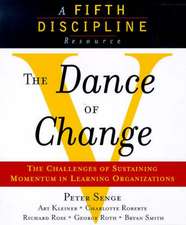Power and Interdependence in Organizations: Cambridge Companions to Management
Editat de Dean Tjosvold, Barbara Wisseen Limba Engleză Paperback – 25 feb 2009
| Toate formatele și edițiile | Preț | Express |
|---|---|---|
| Paperback (1) | 332.20 lei 6-8 săpt. | |
| Cambridge University Press – 25 feb 2009 | 332.20 lei 6-8 săpt. | |
| Hardback (1) | 619.04 lei 6-8 săpt. | |
| Cambridge University Press – 25 feb 2009 | 619.04 lei 6-8 săpt. |
Preț: 332.20 lei
Nou
Puncte Express: 498
Preț estimativ în valută:
63.57€ • 66.54$ • 52.91£
63.57€ • 66.54$ • 52.91£
Carte tipărită la comandă
Livrare economică 31 martie-14 aprilie
Preluare comenzi: 021 569.72.76
Specificații
ISBN-13: 9780521703284
ISBN-10: 052170328X
Pagini: 392
Ilustrații: 6 tables
Dimensiuni: 152 x 228 x 18 mm
Greutate: 0.61 kg
Ediția:New.
Editura: Cambridge University Press
Colecția Cambridge University Press
Seria Cambridge Companions to Management
Locul publicării:Cambridge, United Kingdom
ISBN-10: 052170328X
Pagini: 392
Ilustrații: 6 tables
Dimensiuni: 152 x 228 x 18 mm
Greutate: 0.61 kg
Ediția:New.
Editura: Cambridge University Press
Colecția Cambridge University Press
Seria Cambridge Companions to Management
Locul publicării:Cambridge, United Kingdom
Cuprins
List of figures; List of tables; List of contributors; Foreword; Introduction; Part I. Relationships to Manage the Faces of Power: 1. Understanding power in organizations Jeffrey Pfeffer; 2. How can power be tamed? David G. Winter; 3. Power and self-construal: how the self affects power processes Barbara Wisse and Daan van Knippenberg; 4. The conceptualization of power and the nature of interdependency: the role of legitimacy and culture Joris Lammers and Adam D. Galinski; 5. Power in cooperation and competition: understanding the positive and negative faces of power Dean Tjosvold and Peiguan Wu; Part II. Participative Leadership: Leading with Others: 6. Growing powerful using cherry picking strategies: coworker networks as cherry trees George B. Graen; 7. Acting fairly to be the boss: procedural justice as a tool to affirm power relationships with subordinates David De Cremer and Marius van Dijke; 8. A tale of two theories: implicit theories of power and power-sharing in organizations Peter T. Coleman; Part III. Exchange Dynamics and Outcomes: 9. Power and social exchange Linda Molm; 10. The power process and emotion Edward J. Lawler and Chad A. Proell; 11. Gender inequalities in power in organizations Alice H. Eagly and Agneta Fischer; Part IV. Power to Influence: 12. Power and the interpersonal influence of leaders Gary Yukl; 13. Bases of leader power and effectiveness M. Afzal Rahim; 14. Power tactics preference in organizations: individual and situational factors Meni Koslowsky and Joseph Schwarzwald; 15. Influence triggers and compliance: a discussion of the affects of power, motivation, resistance and antecedents John E. Barbuto, Jr. and Gregory T. Gifford; 16. Leadership and conflict: using power to manage conflict in groups for better rather than worse Randall S. Peterson and Sarah Ronson; 17. Organizational change Lourdes Munduate and Francisco J. Medina; Part V. Leading with Values: 18. Servant-leadership, key to follower well-being Dirk van Dierendonck, Inge Nuijten and Imke Heeren; 19. Ethical leadership: the socially responsible use of power Annebel H. B. De Hoogh and Deanne N. Den Hartog; 20. The tao of value leadership and the power of interdependence Ping Ping Fu and Caroline Fu; Index.
Recenzii
'Why are attitudes toward power so ambivalent when power is a pervasive aspect of organizations? Could this be a Western-culture-centric perspective? The international team of academics contributing to Power and Interdependence in Organizations addresses the positive face of power as well as how to control its negative face.' Jeanne Brett, Northwestern University
'Since power affects us all in one way or another, there is keen interest in understanding its manifestations. This book is groundbreaking because of its focus on the positive and negatives features of power and especially in the context of both individuals and organizations. By emphasizing the constructive and destructive uses of power, across different levels of analysis, the book greatly expands our understanding of power in a major and useful way.' Ken G. Smith, University of Maryland
'Understanding power, its uses and misuses, is fundamental to the human condition and to human survival. This collection by the world's leading scholars in psychology offers a wonderful advance in understanding. Read it, be enlightened and know much better how to make a positive difference in our troubled world.' Michael West, Aston University
'Since power affects us all in one way or another, there is keen interest in understanding its manifestations. This book is groundbreaking because of its focus on the positive and negatives features of power and especially in the context of both individuals and organizations. By emphasizing the constructive and destructive uses of power, across different levels of analysis, the book greatly expands our understanding of power in a major and useful way.' Ken G. Smith, University of Maryland
'Understanding power, its uses and misuses, is fundamental to the human condition and to human survival. This collection by the world's leading scholars in psychology offers a wonderful advance in understanding. Read it, be enlightened and know much better how to make a positive difference in our troubled world.' Michael West, Aston University
Descriere
This collection shows how managers and employees can manage power in order to make it a constructive force in organizations.






























